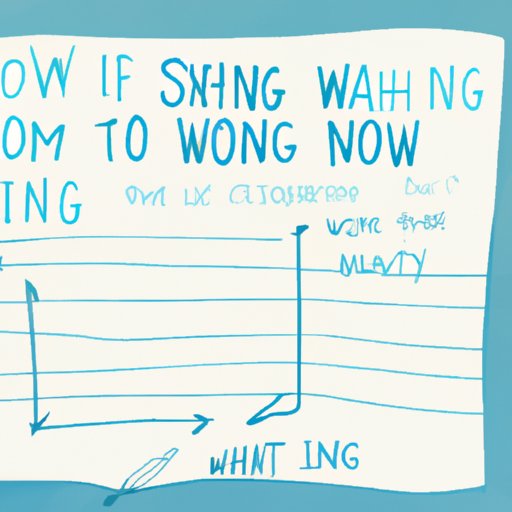How to Write a Song: A Step-by-Step Guide for Songwriters
Have you ever found yourself wanting to write a song but not knowing how to begin? Perhaps you’ve had a melody or a catchy phrase in your head but can’t seem to turn it into a complete song. Don’t worry, as a songwriter, it’s normal to face writer’s block and feel powerless at times. However, writing a song doesn’t have to be as overwhelming as it seems. In this article, we will guide you through a step-by-step process of writing a song. We will cover everything from finding inspiration, basic music theory, lyrics, collaborating, practice, feedback to overcoming writer’s block. Whether you’re an experienced musician or a beginner, this article is for all songwriters who seek guidance and creative direction.
Step-by-Step Process
Before we begin, let’s break down the songwriting process into manageable steps:
- Choose a theme or an idea for your song
- Decide the song’s structure (Verse, Chorus, Bridge, etc.)
- Select an appropriate key and chords for your song
- Create a melody for the song
- Write the lyrics that fit the melody and the structure
- Revise and refine the song until it is complete
While following these steps, it is essential to remember that a good song should not be rushed. Take your time with each step, and don’t forget to enjoy the process.
Finding Inspiration
Inspiration can come from anywhere; you just have to know where to look. Start by taking a walk or spending time in nature, which can help calm your mind and spark creative ideas. Personal experiences and emotions can serve as powerful sources of inspiration. Try writing about experiences that are meaningful to you or stories that you want to tell.
Another way to find inspiration is through creative prompts. A prompt can be anything from a sentence to a picture, a word, or a sound. Let the prompt guide your thoughts and lead you to new ideas. For example, if the prompt is “ocean breeze,” you can write about the calming effects of the ocean or the feeling of a breeze on a summer day.
Music Theory
While music theory can be complicated, it’s essential to have a basic understanding of it. The key of a song is the starting point for the melody, and choosing the appropriate key is critical. When selecting chords, consider how they sound together, as well as what emotions they evoke. For example, minor chords can create a somber feel, while major chords can sound brighter and more upbeat.
There are various song structures, and it’s essential to choose the one that fits your song’s story or theme. For instance, a verse-chorus form is common in pop songs, whereas a bridge section can be added to provide contrast.
Lyric Writing
As songwriters, our lyrics are our stories and expressions of emotions. They are the soul of the song. When writing lyrics, try using metaphors, similes, universal themes, or anything that allows the audience to connect with it. Also, avoid cliches and overused phrases; instead, try and convey your thoughts in a unique way.
The structure of your lyrics is equally important. Limit each line to fewer syllables if you want the song to sound conversational. Also, grouping similar words or ideas together can make a significant impact during the song’s delivery.
Collaboration
Collaboration can be a great way to bring new perspectives and ideas to songwriting. It allows you to stay open instead of fixating on one idea and bringing out the best in a song. When working with a musician or a lyricist, make sure to communicate your vision for the song.
It’s essential to find someone you trust and respect, someone whose creative contributions you value, and someone willing to communicate and compromise.
Practice and Feedback
To improve your songwriting skills, practice and repetition are essential. Try and write every day if you can, even if it’s just a few lines or ideas. You can also share your work with others. It can be a daunting task to get feedback on your work, but it’s necessary to grow as a songwriter.
Some suggestions for getting feedback include seeking it from other songwriters you know or performing at an open mic. Additionally, there are platforms such as SoundCloud and YouTube where you can upload your song and receive feedback from a broader audience.
Overcoming Writer’s Block
Writer’s block can happen to anyone, but it’s essential to find ways to overcome it. A change of scenery can help you overcome writer’s block. Perhaps try moving to a new workspace or spending time outside. Also, listen to and analyze other songwriters’ works for inspiration.
Be patient and remember that your first idea may not always be the best. Take breaks and come back later with a fresh mind. Alternatively, collaboration with other songwriters can also be a great way to overcome writer’s block and bring new ideas to the table.
Conclusion
In conclusion, songwriting is a journey, but with the right tools and mindset, it can be a fulfilling and rewarding experience. Remember the importance of finding inspiration, understanding basic music theory, writing meaningful lyrics, collaborating with others, and practice. And don’t forget to work through writer’s block – everyone experiences it! We hope that this article has provided you with guidance and confidence to start writing your own songs and to enjoy the creative process.
